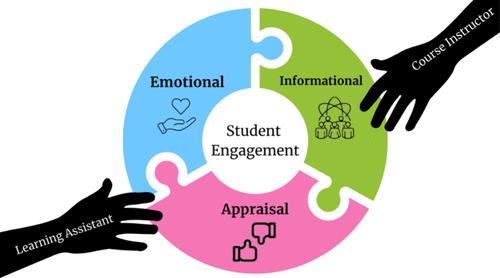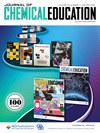在本科生主动学习化学课程中,学习助理和教师提供的社会支持对学生参与度的影响不同
IF 2.9
3区 教育学
Q2 CHEMISTRY, MULTIDISCIPLINARY
引用次数: 0
摘要
主动学习通常是指学生在课堂上以小组形式参与课程材料的学习。这种参与的质量可能是学生从主动学习中获益的关键。社会支持理论认为,教师和学习助理(LA)等关键课堂人员的支持会对学生参与课堂活动产生积极影响。我们探讨了社会支持对多节普通化学课程的影响,这些课程采用两种教学模式:面对面教学和远程同步教学。我们发现,在普通化学课程中,学生认为辅导员和教师都能为学生的主动学习提供高水平的支持。然而,支持对参与度的影响因提供支持的人和支持的类型而异。无论课程环境如何(面对面和远程同步),教师提供的信息支持都会对学生参与主动学习产生重大影响。相比之下,法律顾问提供的评价和情感支持会影响学生的参与度,但法律顾问提供的这些支持的重要性取决于课程背景。总之,我们发现社会支持可以影响学生的课堂参与度,而课程情境在很大程度上影响着所提供的社会支持与学生参与度之间的关系。本文章由计算机程序翻译,如有差异,请以英文原文为准。

Learning Assistants and Instructors Provide Social Support That Influences Student Engagement Differently in Undergraduate Active Learning Chemistry Courses
Active learning commonly involves students engaging with course material in small groups during class time. The quality of this engagement may be key for students to reap the benefits of active learning. Social support theory suggests that supports from key classroom personnel like instructors and learning assistants (LAs) could positively influence student engagement in in-class activities. We explored the influence of social support across multiple sections of general chemistry courses taught in two modalities: in-person and remote synchronous. We found that students perceived that LAs and instructors both provide high levels of support for active learning in general chemistry courses. However, the influence of support on engagement varied by both who was providing it and the type of support being provided. Instructors’ provisioning of informational support significantly affected student engagement in active learning regardless of course context (in-person and remote synchronous). In contrast, LAs provisioning of appraisal and emotional support impacted student engagement, though the importance of each of these supports from LAs depended on course context. Overall, we found social support can influence student in-class engagement and course context greatly influenced the relationship between the provided social support and student engagement.
求助全文
通过发布文献求助,成功后即可免费获取论文全文。
去求助
来源期刊

Journal of Chemical Education
化学-化学综合
CiteScore
5.60
自引率
50.00%
发文量
465
审稿时长
6.5 months
期刊介绍:
The Journal of Chemical Education is the official journal of the Division of Chemical Education of the American Chemical Society, co-published with the American Chemical Society Publications Division. Launched in 1924, the Journal of Chemical Education is the world’s premier chemical education journal. The Journal publishes peer-reviewed articles and related information as a resource to those in the field of chemical education and to those institutions that serve them. JCE typically addresses chemical content, activities, laboratory experiments, instructional methods, and pedagogies. The Journal serves as a means of communication among people across the world who are interested in the teaching and learning of chemistry. This includes instructors of chemistry from middle school through graduate school, professional staff who support these teaching activities, as well as some scientists in commerce, industry, and government.
 求助内容:
求助内容: 应助结果提醒方式:
应助结果提醒方式:


